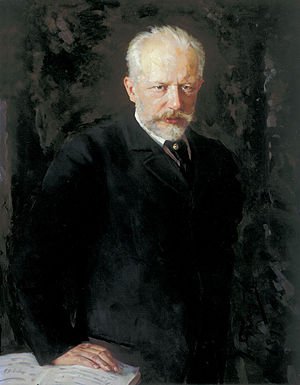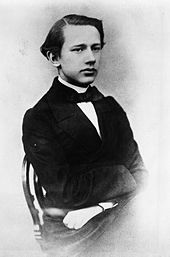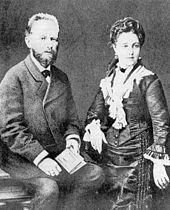Today is Pyotr Ilyich Tchaikovsky's 177th birthday. Tchaikovsky had a huge influence on classical music. Especially in Russia. His style and themes were memorable, and unique to only him. So today, I am going to honor him by writing about 10 of his pieces. But first, here's a little bit about his life:

The Life of Tchaikovsky
Pyotr Illyich Tchaikovsky was born on May 7th, 1840 in Votkinsk, a small town that was in the Russian empire. He came from a military family, with a father and grandfather that both served in the military. He began Piano lessons at age five, and interestingly enough, by the age of 6 he was able to speak German and French fluently (After studying with a teacher that his brother studied with). Within three years of beginning studies on piano, he had already surpassed his teacher in his ability to read music. As a result of this, his parents hired a tutor. At the age of 10, Tchaikovsky would be accepted to study at the Imperial School of Jurisprudence. This school trained students to be civil servants. A job in music was not taken seriously in Russia at this point. The only career options was teaching, or playing as a musician in an Imperial Theatre. Both of these jobs were scoffed by society, and had the same social status as peasantry. The acceptance rate at this school was 12, but Tchaikovsky was ten. This required him to be sent to a boarding preparatory school for two years before he would attend. This time of separation from his mother would cause him emotional trauma for his entire life. Though this Institute prepared Tchaikovsky to have a lowly job of Civil Service, it also gave him the tools he needed to make it as a musical composer.

At the age of 19, Tchaikovsky graduated into a 3 year span of civil service until he left (In 1861) to enroll in classes in Music Theory taught by Nikolai Zaremba at the Mikhailovsky Palace through the Russian Musical Society. This would prepare him to study at the Saint Petersburg Conservatory as part of its premiere class. He would study harmony and counterpoint with Nikolai Zaremba, and composition with protégé, pianist and composer Anton Rubenstein.
At firs, Tchaikovsky would experience little success, and much criticism for his work. This did not help, as he was sensitive to criticism. A famous example being an enraged Nikolai Rubinstein attacking The First Piano Concerto. As time went on, however, Tchaikovsky would grow more and more popularity. Known artists such as Hans von Bülow (Who premiered the First Piano Concerto) began to eagerly perform and premiere his work. Another variable in his success was a shift in the audience's attitude and understanding towards music. Usually, it had been that the audience enjoyed musically simplistic, but flashy (and technically demanding [as in hard to play]) work. But, as Tchaikovsky rose, the audience began to shift and pay more attention to the musical aspect of a piece. Tchaikovsky would also write some operas (Some of which survived, others that he destroyed in hatred).

Tchaikovsky's sexuality is probably the most debated of any of the composers. Many people believe that the might have like members of his own sex due to his lack of a family, while others believe he didn't. Tchaikovsky had one failed marriage, but otherwise was a bachelor his entire life, giving premise to the belief that he may have been gay.
For a few years after his failed marriage, Tchaikovsky would travel around Russia and Europe, financially supported by a friend, Nadezhda von Meck. In 1884, Tchaikovsky would return to Russia, becoming again social. That March, he was allowed to speak with Tsar Alexander III, after being labeled a hereditary nobility (Higher social class). In 1885, Tsar Alexander III would request Tchaikovsky put on his Opera Eugene Onegin at the Bolshoi Kamenny Theatre in Saint Petersburg. This meant that Tchaikovsky's music was taking the place of Italian opera as the official Imperial art, and supplied him with a lifetime annual pension of 3,000 rubles. This made him the (unofficial) court composer.

On October 16th (or 28th) 1893, in Saint Petersburg, Tchaikovsky conducted the premiere of his 6th Symphony the Pathétique. 9 days later, the composer was dead. It is debated whether Tchaikovsky died from drinking unboiled water at a local restaurant, leading to cholera, or if it was suicide. Whatever the case, Tchaikovsky died on October 25th (or November 6th) at the age of 53. He was burried in Tikhvin Cemetery, near the graves of composers such as Alexander Borodin, Mikhail Glinka, and Modest Mussorgsky (Night on Bald Mountain).
10 Compositions
Here are 10 pieces by Tchaikovsky:
10. Symphony no. 5 (Movement 4)
I like to label this, The Underdog movement. It starts out like it is unsure of itself, sentimental, but it doesn't know what it is capable of. But as time progresses, it grows confident and magnificent. Tchaikovsky knew how to make a piece of music flow. This symphonic movement really does seem to grow as time goes. It came in as a lamb, and out as a lion.

9. Symphony no. 6 (Movement 4)
This movement sounds like it could be the theme for a bad guy in a movie. It has beliefs and feelings, but overall it stands out as angry and evil. You can hear tender weakness, but Tchaikovsky transforms a tender theme to a nefarious purely evil theme. If I heard this and didn't know what it was, I'd probably be able to guess Tchaikovsky.

8. Marche Slave
This piece also sounds like it could be a villains theme song. IT sounds similar to Wagner's Ride of the Valkyries. Perhaps that is why the Ride of the Valkyries is on my auto play watch next list. This piece also sounds similar to The Imperial March from Star Wars. Tchaikovsky knew how to write with an evil sound. It sounds like he uses a sort of Hungarian style in this piece.

7. The 1812 Overture
Oh my goodness. The coolest part about this piece is how Tchaikovsky incorporates sound effects. You can hear cannons going off, church bells ringing, and even a snare drum (Used to keep a Marching Rhythm in war). It is obvious that this overture is about war. In fact, it is to commemorate Russia keeping Napoleon out in the year 1812. I was curious why Tchaikovsky would write a piece about a war between America and Britain, but really it would appear to be about something that coincidentally happened the same year as the War of 1812.

6. Symphony no. 4 (Movement 4)
This piece is fast! We are currently playing it for band, and the woodwinds have the string part. It looks tough! As I wrote about in my list of 7 Symphonies You Should Listen to this Week,
If the horns didn't have about two measures of 16th notes, we'd be able to sight read it because it is only quarter, 8th, half, and whole notes. Meanwhile, the woodwinds have a giant blur of black 16th and 32nd notes to play.
This piece has some great themes for brass, and even sometime woodwinds/strings. It is energetic, and catchy!

5. Sleeping Beauty Waltz
I included this piece in my list of 7 Pieces of Classical Music Used in Popular Movies 5 months ago. It is incredible because this piece is also used in the Disney movie Sleeping Beauty, and you can hear the main theme played out in the movie, only with words. I am sure you will at least recognize the melody.

4. Romeo and Juliet Fantasy Overture
This is definitely about Romeo and Juliet. You can hear sections that are sentimental, with that recognizable theme. Likely where Romeo and Juliet are falling in love. And other sections with that dominant and assertive theme. Likely when the families clash, or Romeo and Juliet kill themselves. Tchaikovsky really seems to have known how to tell a story through music.

3. Swan Lake (Finale)
Swan lake is probably one of Tchaikovsky's most famous ballets. It also (as I have heard from my friends who dance) contains some of the hardest moves ever choreographed. This finale is exhilarating. It has everything a Finale should have, it is grand, triumphant, and bold. The oboe solo in the beginning kind of reminds me of the oboe solo in the second movement of Schubert's Great Symphony.

2. Piano Concerto no. 1 (Movement 1)
This is probably one of the most famous Piano Concertos ever written. It contains magnificent themes, and is one of the hardest piano pieces to play. I love how Tchaikovsky introduces the first theme (right away) with the French horns. As a French hornist, I know that composers often neglect the French horns, but as I've learned through all of these pieces, not Tchaikovsky. He recognizes that the horn has a distinct sound that can be uniquely used to give a bold (yet slightly held back) sound.

1. Dance of the Sugar Plum Fairy (The Nutcracker)
This piece is very famous. This and the Nutcracker March, are likely the most famous themes from the whole ballet. It is surprising that Tchaikovsky disliked The Nutcracker when he first wrote it, considering that it contains so many memorable themes, and is (in modern times) probably his most famous piece. Here is the Dance of the Sugar Plum Fairy:

Sources
Information
Wikipedia
Photos
Wikipedia
Previous Composer Birthdays (In order by how recent it was)
4/1 - Sergei Rachmaninoff
3/21 - Johann Sebastian Bach
3/4 - Antonio Vivaldi
3/1 - Frédérick Chopin
2/28 (29) - Gioachino Rossini
2/3 - Felix Mendelssohn
1/31 - Franz Schubert
1/27 - Wolfgang (Amadeus) Mozart
The Next Birthdays will be Johannes Brahms on May 8th.
Thanks for reading this! Sorry I couldn't get Brahms out today, I was planning to, then my browser crashed, and deleted the entire Tchaikovsky article I had written. I will hopefully write something tomorrow for Brahms. But here is Tchaikovsky. Please, let me know what your favorite piece was! Remember to check back later!

Also remember to check for: My weekly 7 post, As Well As My Composer Birthday Posts
